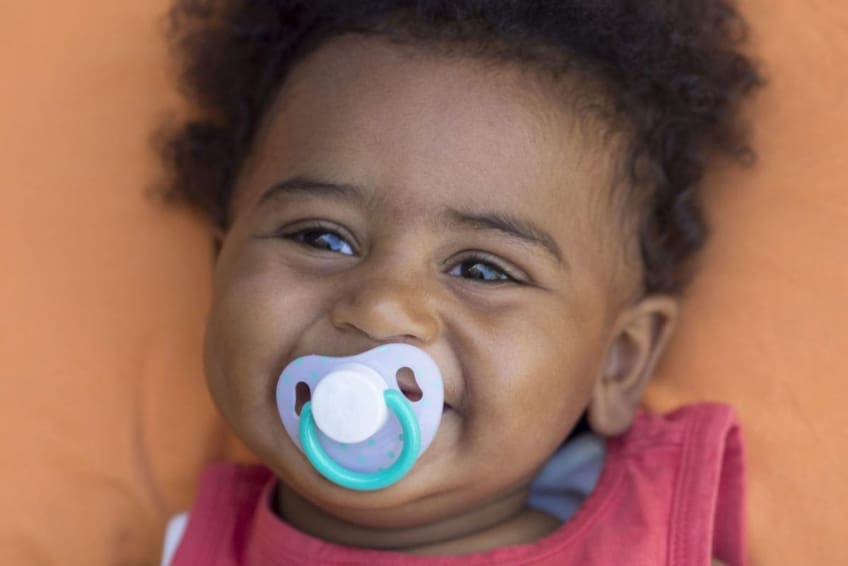
Babies are known for putting things in their mouths. This includes thumbs, fingers, and pacifiers. But are these things good for them? There’s a lot of debate and worry on the subject. Here are some facts about babies and their favorite things to suck.
Understanding thumb sucking and pacifiers in babies
Sucking on thumbs, fingers, and pacifiers is common in babies. It is a part of normal development. Babies are born with the need to suck. Some even do it before they’re born. Eating doesn’t always satisfy that need. So they look elsewhere.
Why babies suck their thumbs or use pacifiers
Sucking has a calming and soothing effect on babies. Whether they find their own hand or a pacifier you’ve provided, it’s going in their mouth. Which is best? There are pros and cons to all.
Benefits and risks of thumb sucking and pacifiers
Most babies will suck on a thumb or finger, even for a short time. But what if this becomes a habit?
Thumb sucking
Comfort and soothing benefits
- Fingers and thumbs are lower maintenance.
- Babies know where to find them in the dark. If it falls out, the baby knows how to put it back in.
- They don’t fall on the floor and get dirty.
- You don’t have to worry about losing them and your baby getting upset.
Concerns about germs, ear infections and dental problems
- Your baby touches lots of things during the day. If you’re worried about germs, they can put a lot of them in their mouths with a thumb.
- Studies have shown that thumb sucking can increase a baby’s risk of getting an ear infection.
- Thumb sucking can be a harder habit to break.
- Thumb or finger sucking past age 4 (or when permanent teeth start coming in) can do damage to the teeth or the child’s bite.
Pacifiers
Pacifiers are often given in the hospital. Do they help or just cause more problems?
Pros
- They reduce pain during common procedures. These could include blood draws or shots.
- They reduce the risk of Sudden Infant Death Syndrome (SIDS) while a baby is sleeping.
- Premature babies have shorter hospital stays and better bottle feedings.
- You can choose whatever kind you want at the store. Most aren’t expensive.
- You can limit your child’s use of them or even take them away. This could make breaking the habit easier.
Cons
- Some babies may breastfeed less if they have a pacifier. This is called nipple confusion.
- It can increase the risk of ear infections.
- Your baby can lose it at night and wake up crying for it.
- Your baby can spit it out, and it can fall to the ground and get dirty.
- You don’t have an infinite supply. If you lose it, your baby probably won’t be very happy.
- Prolonged use can also lead to problems with your child’s teeth.
Sucking is a natural instinct that helps your baby. Whether you encourage thumb sucking or a pacifier is up to you.
Things to consider
Here are some tips if you decide to give your baby a pacifier:
- They are most helpful in babies younger than 6 months.
- Never force your baby to use a pacifier. If it comes out during sleep, don’t put it back in.
- Don’t put anything on the pacifier to make it more enticing. This includes honey or sugar.
- Clean and replace the pacifier often.
- Never tie a pacifier around your baby’s neck, arm, or hand. This can lead to serious injury, even death.
- Consider stopping pacifier use between 6 months and 1 year of age. After that time, it will be harder to break the habit.
- Don’t let your child use a pacifier after 4 years of age.
When to wean from thumb sucking and pacifiers
Most children stop sucking on their own between the ages of 2 and 4. If this isn’t happening, you may need to help them break the habit. This can be very challenging. Consider these tips before you try it:
- Praise your child for not using the pacifier or sucking. Don’t scold them when they do.
- Your child may be sucking or want the pacifier because they are feeling anxious or insecure. Try to fix the cause of the anxiety. You can be the source of comfort for your child instead of the pacifier.
- Reward your child when they get through a difficult experience without sucking or using a pacifier.
Questions to ask your doctor
- Which is better for my baby, a thumb or a pacifier?
- What kind of pacifier is best to use?
- At what age should I start discouraging my child from using a pacifier?
- At what age should I grow concerned that my child may be doing damage to their teeth or mouth?
- What do I do if I can’t get my child to stop sucking their thumb?
Resources
Centers for Disease Control and Prevention (CDC): Infant Development Milestones
![]()
Copyright © American Academy of Family Physicians
This information provides a general overview and may not apply to everyone. Talk to your family doctor to find out if this information applies to you and to get more information on this subject.







